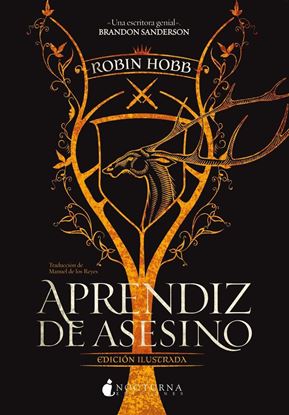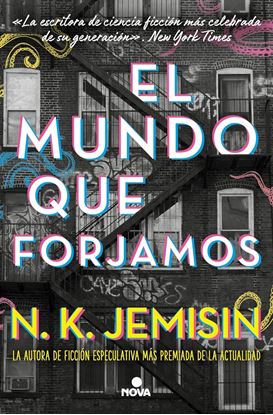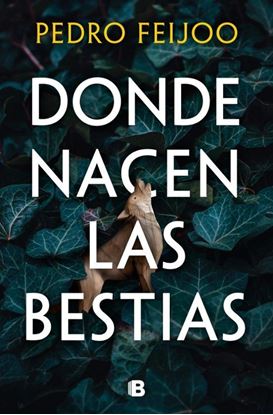

CAMPOS DE CASTILLA (ILUSTR)
Campos de Castilla es una obra clave de la poesía española del siglo XX: un sentido homenaje a España y a sus gentes que marcó un antes y un después en la carrera literaria de Antonio Machado. Tanto es así que en estos términos se expresaba en La Vanguardia en 1912 el intelectual Bernardo G. de Candamo: «Nos hallamos ante un caso de transformación artística (…). Es decir que Antonio Machado, el de antes, no es más que un homónimo de el de ahora». De hecho, el texto de Machado indagaba en nuevos terrenos poéticos, históricos y sociales y se convirtió en un éxito de crítica y público que se ha extendido hasta el día de hoy.
A través de una sensibilidad única y de una creatividad desbordante, David de las Heras ilustra este poemario para que cobre nueva vida frente a los ojos de los lectores actuales.
1,600
1,280
APRENDIZ DE ASESINO (1)
Traspié, hijo bastardo del príncipe heredero al trono de los Seis Ducados, carece de aliados. Solo su vínculo mágico con los animales, el antiguo arte conocido como la Maña, le brinda compañía. Pero la magia es peligrosa cuando se emplea con frecuencia y el uso de la Maña está penado con la muerte. Cuando el rey Artimañas lo convoca a la corte, Traspié emprende una nueva vida llena de intrigas palaciegas. A las órdenes del rey, inicia su formación en las artes del asesinato... y también en las de la Habilidad, una magia reservada al linaje real con la que es posible comunicarse mediante la mente, manipular los pensamientos ajenos e incluso sembrar ideas extrañas. Ambientado en un reino donde los miembros de la familia real reciben su nombre por las virtudes que encarnan, Aprendiz de asesino es el primer tomo de la icónica trilogía del Vatídico, editada ahora con ilustraciones de Magali Villeneuve. Cada uno de sus libros ha encumbrado a Robin Hobb como una de las voces fundamentales y más premiadas de la literatura fantástica universal.
1,600
1,280
EL MUNDO QUE FORJAMOS
Hay cosas que no van del todo bien en la ciudad que nunca duerme. Los avatares de Nueva York han conseguido evitar temporalmente la invasión de la Mujer de Blanco (y de paso la destrucción de todo el universo), pero el misterioso Enemigo con E mayúscula esconde poderes más sutiles bajo la manga. Un nuevo candidato a la alcaldía, experto en el arte de la retórica populista de la gentrificación, la xenofobia y la «ley y el orden», puede llegar a conseguir cambiar la naturaleza de la Gran Manzana.
Para derrotarlo a él y al Enemigo que lo controla en las sombras, los avatares deberán unirse con el resto de las ciudades grandiosas. O arriesgarse a la aniquilación completa de su mundo.
1,600
1,280
LA PELIRROJA DE AUSCHWITZ
Crasna, 1944: Rosie tiene dieciocho años cuando es arrancada de la vida familiar en su pueblo natal en la frontera rumano-húngara por los nazis. Desde ese momento comienza su inimaginable viaje a través del infierno, que la lleva a varios campos de trabajo y concentración. En Auschwitz, Rosie pierde incluso el último vestigio de dignidad, pero en medio de toda la desesperanza se da cuenta de algo: los nazis nunca podrán quitarle su fuerza interior. Y así, a pesar de las atrocidades inimaginables a su alrededor, ella permanece decidida a no rendirse.
1,600
1,280
CITA CON LA MUERTE
El invierno ha llegado a los jardines de Santa Rita. Nuevas intrigas acechan a los habitantes del balneario. La hija de uno de los residentes ha confesado el asesinato de su exmarido, un cineasta de dudosa reputación, pero la inspectora Lola Galindo siente que hay algo que no encaja. El excomisario Robles comienza a investigar un plan que podría desembocar en un asesinato en la comunidad. La sobrina de Sofía, Greta, consigue por fin desvelar el último misterio de la historia de su familia y, con él, el origen de la "maldición" de Santa Rita, sacando a la luz los secretos que se creían ya sepultados para siempre.
1,600
1,280
DONDE NACEN LAS BESTIAS
Año 2003. Una espesa bruma cubre el valle gallego, donde aún resuena el eco de los sangrientos crímenes cometidos por Romasanta, el primer asesino en serie de nuestra historia. Han pasado casi dos siglos, pero su nombre sigue vivo, convertido en una leyenda que continúa aterrorizando a todos los niños del lugar. A todos, menos al pequeño Manel.
Veinte años después, cuando aparece un hombre asesinado salvajemente a dentelladas, el inspector Mateo Romano ni siquiera sospecha que ese solo es el primero de una atroz sucesión de crímenes. La investigación lo conducirá hasta las entrañas de ese valle, en el que todavía se habla de la bestia que habita en las profundidades del bosque. ¿Puede una vieja leyenda contener la clave para detener al asesino?
1,600
1,280














